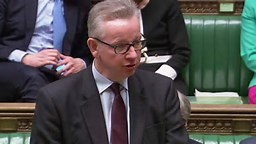By Ben Kerrigan-
Environment Secretary Michael Gove has gone against Theresa May’s critics by opening today’s debate on a no-deal Brexit by praising the Prime Minister for her loyalty to the country. May was absent from the commons today after loosing her voice, said by some observers to metaphorically symbolise her loss of grip of power on authority.
Gove praised the prime minister for her fortitude and tenacity, stating that she has always put the country first. Ms May has faced criticism after a second defeat in parliament yesterday, and some have called for her to step down over the shambles that has seen her deal voted down twice. Those who call for her resignation have not pointed to any potential successor who would deliver anything better to solve the present crisis that appears to reduc parliamentarian Mps to a bunch of clueless politicians.
In reality, the issues are sensitive and complex, with no strong voice on how parliament should proceed to make Brexit work. May as leader of the country has had to bear the burden of all criticisms despite the obvious fact none of her critics has been able to propose a practical alternative. Gove’s praise was respectable. He said:
“She may have temporarily lost her voice but what she has not lost — and will never lose — is a focus on the national interest and a full-hearted desire to do what is right for our country,” Gove, a prominent Brexiteer who has been consistently loyal to May, said.
He added that May has “always puts country first” and has spent “more than 19 hours at the despatch box … has shown fortitude, tenacity, thoughtfulness, diligence — and above all an unselfish and unstinting patriotism.” parliament, Environment Secretary Michael Gove said Members of Parliament faced a “number of unattractive choices.”
”It is important that the House realizes that all of these choices are less attractive than support for the deal that the Prime Minister negotiated,” Gove said.
”We can choose as a House to leave without a deal, but there are significant economic, political and constitutional challenges if we embark on that course,” he warned, adding that it would also “undermine and further erode faith in democracy.” May’s weakness is in not knowing the deal she planned to present to Mps would fail, unless she could convince them to buy into the idea.
Two amendments to Prime Minister Theresa May’s motion on crashing out of the European Union without a deal have been selected by Speaker of the House of Commons John Bercow.
May’s motion states that the House “declines to approve” leaving the EU on March 29 without a withdrawal agreement or future relationship framework, and notes that leaving without a deal remains the default position unless the UK and EU ratify an agreement
The amendments to be debated by MPs and that could later be put up for a vote are:
Amendment (a) Rejects a no-deal Brexit at any time and under any circumstances.
Amendment (f) Calls for a delay to Brexit day from March 22 until May 22, 2019, for further preparations to take place, but acknowledges a definitive departure in 2021.
Theresa May was today faceing angry backlash for instructing Tory MPs to vote against a motion that clearly rules out a no-deal Brexit. The prime minister had promised to give her MPs a free vote on the issue, but her later comments instructing Mps to vote against an amendment tabled by Tory backbencher Caroline Spelman. has caused uproar among many Mps.
On another shambolic day of mayhem in Westminster, No10 said Tory MPs would only be allowed a free vote on the government motion and another amendment that would lead to a no-deal Brexit, but not on Ms Spelman’s motion. Cabinet ministers had been livid with the idea of having no alternative to Ms May’s deal,. May has insisted the UK can still leave the EU with a “good deal” and said she would vote later to rule out a no-deal exit on 29 March. The British prime minister warned MPs they faced “hard choices” after rejecting her deal for a second time. The EU has urged the UK to take “responsibility” for its actions.
“Again the House of Commons says what it doesn’t want,” Mr Barnier told the European Parliament. “Now this impasse can only be solved in the UK. EU chiefs said they had gone “as far as it possibly can” to satisfy MPs’ concerns over the agreement, particularly in relation to the backstop, an insurance policy to stop a hard border on the island of Ireland.
“If the UK still wants to leave the EU in an orderly manner, this treaty is, and will remain, the only treaty possible,” he said.




